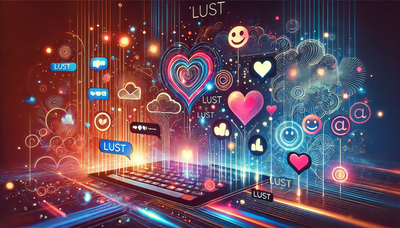
<<p>Human emotions are diverse and complex, often defying simple categorization. One such powerful emotion is <strong>lust</strong>, a term that has intrigued and perplexed humanity for centuries. But what is <strong>lust</strong>, and how does it shape human behavior and relationships? Let’s delve into the meaning, nuances, and implications of this fascinating emotion.</p><h2><strong>What Is Lust?</strong></h2><p>At its core, <strong>lust</strong> is an intense desire or craving, most commonly associated with sexual attraction. The <strong>definition of lust</strong> often focuses on its physical and emotional aspects, describing it as a strong yearning for something—typically intimacy or pleasure. In essence, <strong>lust means</strong> a deeply felt, sometimes overwhelming urge that drives an individual toward a particular object of desire.</p><p>This emotion isn’t limited to sexual contexts. It can manifest as an intense craving for power, success, or material possessions. However, its most recognized form revolves around physical attraction and sexual desire.</p><h2><strong>Lust vs. Love</strong></h2><p>One common misconception is equating <strong>lust</strong> with love. While they may coexist, they are distinct emotions with different foundations:</p><ul><li><p><strong>Lust</strong>: Primarily rooted in physical attraction and immediate gratification. It’s often described as a short-term, passionate feeling that doesn’t necessarily involve deeper emotional connection.</p></li><li><p><strong>Love</strong>: Built on emotional intimacy, trust, and long-term commitment. Love encompasses a broader spectrum of feelings and requires time to nurture and grow.</p></li></ul><p>Understanding the difference between <strong>lust vs love</strong> is crucial in navigating relationships and setting realistic expectations. Misinterpreting one for the other can lead to misaligned goals and emotional challenges.</p><h2><strong>What Does Lust Mean in Different Contexts?</strong></h2><p>The <strong>meaning of lust</strong> extends beyond its common association with physical attraction. Historically and culturally, the term has been used in various ways:</p><ol><li><p><strong>Religious and moral perspectives</strong>: In many traditions, <strong>lustful meaning</strong> carries a negative connotation, often considered a sin or moral failing. Religious texts frequently caution against succumbing to lust, associating it with temptation and moral weakness.</p></li><li><p><strong>Psychological interpretations</strong>: Psychologists view <strong>lust</strong> as a natural and biologically driven response, rooted in the human instinct to seek pleasure and procreate. It is seen as a fundamental component of human sexuality, influencing behaviors and interpersonal dynamics.</p></li><li><p><strong>Art and literature</strong>: In creative works, <strong>lusting</strong> often symbolizes human vulnerability, passion, or even destructive impulses. Classic literature and modern media alike use lust as a driving force for character development and plot twists.</p></li></ol><h2><strong>Lust Caution: Recognizing Its Impact</strong></h2><p>While <strong>lust</strong> can be a natural and healthy emotion, it’s important to approach it with caution. Unchecked or misunderstood, it may lead to complications, such as:</p><ul><li><p>Impulsive decisions driven by physical desire rather than rational thought.</p></li><li><p>Confusion in relationships, particularly if one party mistakes <strong>lust</strong> for deeper emotional commitment.</p></li><li><p>Feelings of guilt or regret, especially in societies or cultures where <strong>lust</strong> is stigmatized.</p></li></ul><p>Healthy exploration of <strong>lust</strong> involves self-awareness and open communication. Acknowledging its presence and understanding its implications can help individuals make more informed and balanced decisions.</p><h2><strong>The Evolution of Lust: Biological and Psychological Insights</strong></h2><p>From an evolutionary standpoint, <strong>lust</strong> serves a critical function in ensuring the continuation of the species. It’s driven by hormones like testosterone and dopamine, which create feelings of attraction and euphoria. These chemical responses are not only natural but also integral to human bonding and reproduction.</p><p>Modern psychology, however, emphasizes the need to distinguish between primal urges and the deeper emotional connections that sustain meaningful relationships. Lust can be a gateway to deeper bonds, but it should not be mistaken for emotional intimacy or commitment.</p><h2><strong>Whats Lust in Modern Society?</strong></h2><p>In contemporary culture, <strong>lust</strong> is often glamorized in media and advertising, which frequently use sexual imagery to evoke desire. This pervasive depiction can shape societal attitudes, making it important to critically assess how <strong>lust meaning</strong> is presented and internalized.</p><p>At the same time, the rise of digital platforms has transformed how people experience and express <strong>lust</strong>. Social media, dating apps, and other online tools have created new avenues for exploring attraction, but they also introduce challenges such as superficial connections and unrealistic expectations.</p><h2><strong>The Positive Side of Lust</strong></h2><p>Although often viewed negatively, <strong>lust</strong> can have positive aspects when channeled constructively:</p><ol><li><p><strong>Creativity and inspiration</strong>: Intense emotions like lust can fuel artistic and personal expression.</p></li><li><p><strong>Strengthening relationships</strong>: In healthy partnerships, lust can enhance physical intimacy and mutual attraction.</p></li><li><p><strong>Personal exploration</strong>: Understanding one’s desires can lead to greater self-awareness and confidence.</p></li></ol><h2><strong>Conclusion</strong></h2><p>Understanding <strong>what is lust</strong> involves more than just defining it; it requires exploring its origins, implications, and distinctions from other emotions. While <strong>lust</strong> can be a powerful and natural part of human experience, recognizing its boundaries and interplay with emotions like love is essential for emotional well-being and healthy relationships.</p><p>By appreciating the nuances of <strong>lust definition</strong>, individuals can approach their desires with awareness and balance, ensuring that this intense emotion enriches rather than complicates their lives. In doing so, <strong>lust</strong> can be seen not as a weakness, but as a dynamic and integral aspect of the human condition, one that invites both introspection and connection.</p>